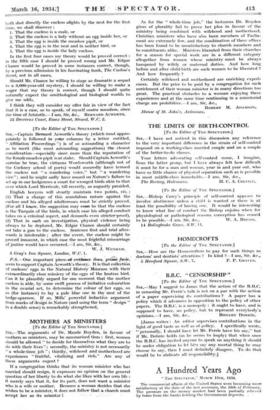MOTHERS AS MINISTERS [To the . Editor of THE - SPECTATOR.] SIR,—The. arguments
of Dr. Maude Royden, in favour of mothers as ministers, may be summarized thus : first, women should be allowed " to decide for themselves what they are to do with their lives ; secondly, the ministry is not necessarily "a whole-time, job "; thirdly, wifehood and motherhood are experiences "fruitful, vitalizing and rich." Are any of these arguments cogent ?
If a congregation thinks that its woman minister who has married should resign, it expresses no opinion on the general question of her liberty to do what she likes with her own life :
it merely says that it, for its part, does not want a minister' who is a wife or mother. Because a woman decides that she wishes to be a minister, it does not- follow that a church must
accept her as its minister . As for the " whole-time job," the instances Dr. Royden gives of plurality fail to prove her plea in favour of the ministry being combined with wifehood and motherhood. Christian ministers who have also been members of Parlia-, ment are extremely few, and the combination of these offices has been found to be unsatisfactory to church members and to constituents alike. Ministers liberated from their churches for a season for special work are in a different category altogether from women whose ministry must be always hampered by wifely . or maternal duties. And how long before .and after child-birth are such women to be liberated ? And how frequently ?
Certainly wifehood and motherhood are enriching experi- ences. But the price to be paid by a congregation for such enrichment of their woman minister is in many directions too great. The practical obstacles to a woman enjoying these experiences and at the same time continuing in a ministerial charge are prohibitive.—I am, Sir, &c., Manse of St. John's, Ardrossan.
ROBERT M. ADAMSON.










































 Previous page
Previous page